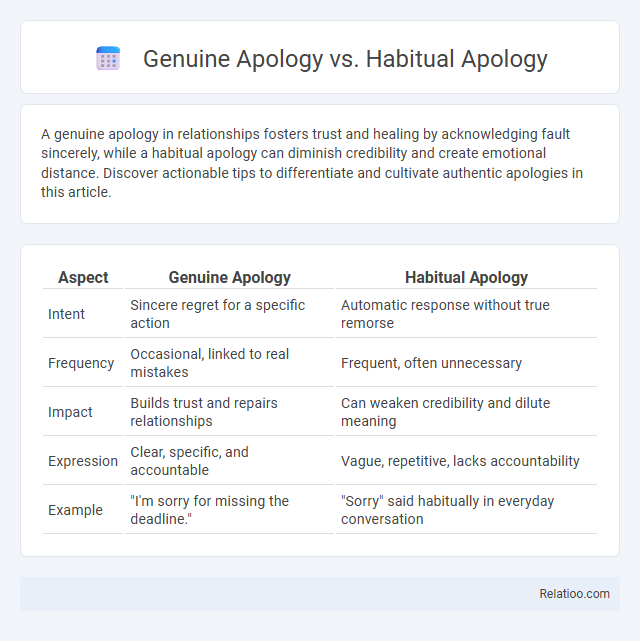A genuine apology in relationships fosters trust and healing by acknowledging fault sincerely, while a habitual apology can diminish credibility and create emotional distance. Discover actionable tips to differentiate and cultivate authentic apologies in this article.
Table of Comparison
| Aspect | Genuine Apology | Habitual Apology |
|---|---|---|
| Intent | Sincere regret for a specific action | Automatic response without true remorse |
| Frequency | Occasional, linked to real mistakes | Frequent, often unnecessary |
| Impact | Builds trust and repairs relationships | Can weaken credibility and dilute meaning |
| Expression | Clear, specific, and accountable | Vague, repetitive, lacks accountability |
| Example | "I'm sorry for missing the deadline." | "Sorry" said habitually in everyday conversation |
Understanding Genuine Apology: Core Elements
Understanding genuine apology involves recognizing key elements such as sincere acknowledgment of wrongdoing, expressing regret without excuses, and a clear commitment to change behavior. Habitual apology lacks authenticity, often serving as a social habit without true remorse, undermining trust and communication effectiveness. Reoccurrence of the same behavior after an apology highlights the importance of accountability and consistent actions to validate the sincerity of the apology.
What Drives Habitual Apology?
Habitual apology is driven by deep-seated psychological factors such as low self-esteem, anxiety, and a desire for social acceptance, causing individuals to over-apologize even when unnecessary. Unlike genuine apology, which involves sincere regret for specific actions, habitual apologies become automatic responses to perceived social discomfort or self-doubt. This repetitive behavior often stems from learned communication patterns and can undermine personal confidence and interpersonal relationships.
Emotional Impact: Genuine vs Habitual Apologies
Genuine apologies convey sincere remorse and foster emotional healing, strengthening trust and connection between individuals. Habitual apologies, often perceived as insincere or automatic, can diminish their emotional impact and may lead to frustration or resentment. Understanding the difference helps Your relationships by encouraging meaningful communication and reducing negative feelings associated with repetitive or hollow apologies.
Language Patterns and Phrasing Differences
Genuine apologies use clear, specific language acknowledging fault and expressing sincere regret, such as "I am sorry for my mistake and will make it right." Habitual apologies often include vague or excessive phrasing like "Sorry if I bothered you," indicating a pattern without true responsibility. Reoccurrence apologies combine elements of both but tend to repeat similar phrasing without meaningful change, signaling unresolved issues in your communication.
Social Consequences of Over-Apologizing
Over-apologizing, especially through habitual apologies, can erode an individual's perceived confidence and authority in social and professional settings. Genuine apologies typically foster trust and empathy, while excessive or repetitive apologies may lead others to view the apologizer as insecure or lacking accountability. This social consequence often results in diminished respect and can undermine effective communication within relationships or workplace environments.
Building Trust Through Sincere Regret
Sincere regret expressed through a genuine apology fosters trust by acknowledging responsibility and showing empathy, which strengthens relationships. Habitual apologies, however, often diminish credibility and may signal insincerity, undermining trust instead of building it. To maintain Your integrity and rebuild trust after reoccurrence of mistakes, focus on meaningful actions and clear communication alongside sincere apologies.
The Psychology Behind Repeated Apologies
Repeated apologies often stem from underlying feelings of anxiety or low self-esteem, causing individuals to apologize habitually without addressing the root cause of their behavior. Genuine apologies reflect true remorse and a commitment to change, whereas habitual apologies may become automatic responses that dilute their meaning and impact. Understanding this psychological pattern helps you recognize when apologies are sincere versus when they mask deeper issues requiring attention beyond verbal regret.
When Apologies Lose Their Meaning
Repeated apologies without change in behavior dilute the sincerity of the gesture, leading to habitual apologies that lose their impact. Genuine apologies involve acknowledgment of wrongdoing, expressing remorse, and committing to corrective action, which restores trust and resolves conflict effectively. When apologies become mere automatic responses to reoccurring mistakes, they fail to convey responsibility, making forgiveness and reconciliation difficult to achieve.
Strategies to Cultivate Authentic Apologies
Cultivating authentic apologies requires recognizing the difference between genuine apology, habitual apology, and reoccurrence by focusing on accountability and specific actions to prevent future mistakes. Employing strategies such as expressing sincere remorse, acknowledging the impact of one's behavior, and outlining concrete steps for change fosters trust and emotional healing. Avoiding vague or repetitive apologies enhances communication and reduces the likelihood of repeated offenses.
Encouraging Healthy Communication in Relationships
Genuine apology involves sincere acknowledgment of wrongdoing and commitment to change, fostering trust and emotional intimacy in relationships. Habitual apology, often excessive or insincere, can diminish the impact of apologies and hinder authentic communication. Recognizing the difference between genuine apologies and repetitive mistakes encourages accountability, promotes mutual respect, and supports healthier, more open dialogue.

Infographic: Genuine Apology vs Habitual Apology
 relatioo.com
relatioo.com